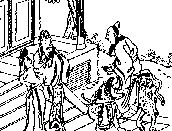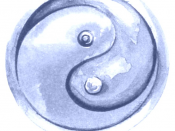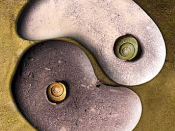Taoism applied to everyday life "If nothing is done than all will be well," (Chapter 3). In Taoism this is the concept known as "Way". The Way is the practice of doing and not-doing. This concept comes from the theory of the Yin and Yang. The Yang is the practice of doing. The Yin is the practice of not-doing. One compliments the other, and each cannot exist alone. The Tao tells people to practice not-doing because it will bring happiness in their life. By not-doing, the Tao means not performing actions, which are unnecessary and uncalled for. People should just take things as they come in life and they will live a life full of happiness and pleasure. "Working and not taking credit, leading yet not dominating, the Primal Virtue," (Chapter 10).
"If kings and lords could harness it ...men would need no more instruction, all things would take their course,"(Chapter 32).
If you work against your Tao, you will never find happiness. "Teaching without words and working without doing are understood by very few," (Chapter 43). "Those who know do not talk, those who talk do not know,"(Chapter 56).
Many people mistake conceptual knowledge for the map to the territory. The Sage is our map to the Tao. He points his finger to show us the way, but does not really tell us what to do and how to practice Taoism. Lao Tzu's concepts of the Tao can be a guide to rational living. If one follows these beliefs he is guaranteed happiness in his life. However, it is very difficult to follow the Tao, even though Lao Tzu says " My words re easy to understand and easy to perform, yet no man under heaven knows them or practices them,"(Chapter 70).
The reason the Tao is...


